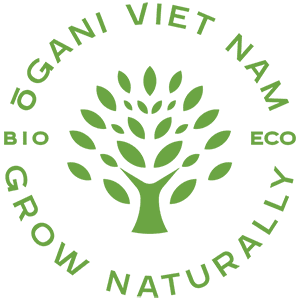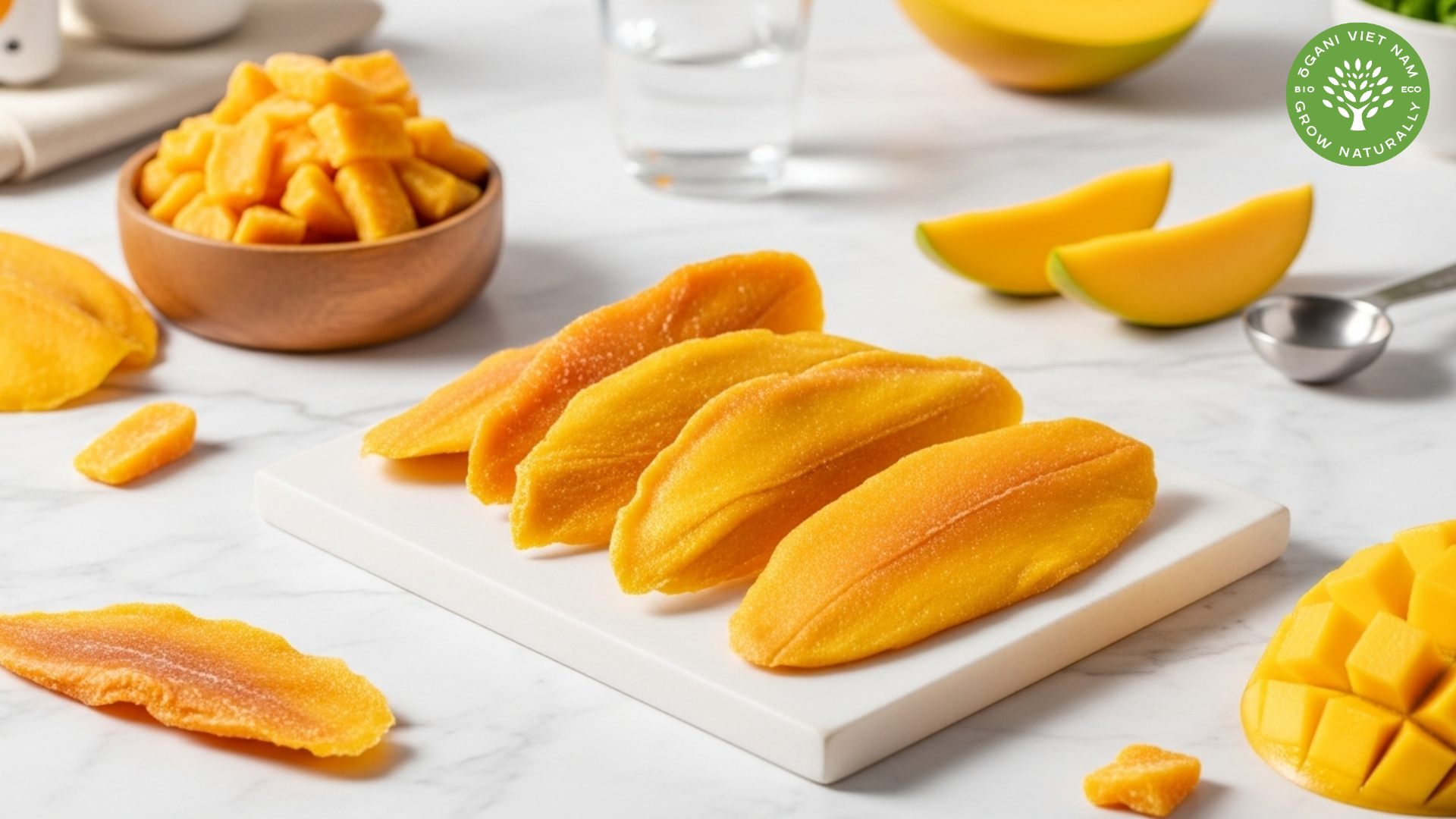
Dried mango with no sugar added is packed with vitamins, minerals, and pure natural energy – nothing artificial, just the real taste of mango. At Ogani VN, we believe that the little choices you make each day shape your wellbeing. That’s why we carefully select only the most wholesome dried fruits, so every bite truly supports your healthy lifestyle.
Understanding the nutritional profile of sugar-free dried mango
When fresh mangoes are gently dried without adding sugar, what’s left is a snack full of concentrated goodness – rich in natural nutrients and bursting with the essence of the fruit itself. Dried mango with no sugar added gives you about 120–140 calories in a 40-gram serving, making it a smart source of energy for an active day.
Because no extra sugar is added, you’re only enjoying the fruit’s own natural sweetness – mostly fructose – which the body handles more gently than refined sugar. In every serving, you’ll find roughly 24–26 grams of natural sugars, 2–3 grams of fiber, less than 1 gram of fat, and a touch of protein (around 1 gram). But the true highlight lies in the vitamins and minerals packed inside.
One of the most remarkable benefits of sugar-free dried mango slices is their high potassium content – giving you about 8% of your daily needs in just one serving. Potassium supports heart health and keeps your muscles working smoothly, making these golden slices an ideal choice for athletes and anyone looking after their wellbeing.
Vitamin and mineral powerhouse benefits
The vitamin profile of unsweetened dried mango is surprisingly rich. Just one serving can give you up to 15% of your daily Vitamin A needs, helping to protect your eyes and strengthen your immune system. While some Vitamin C is lost during drying, the fruit still offers a meaningful boost of antioxidants.
You’ll also find small but valuable amounts of iron and calcium. Though modest, these minerals add to the overall balance of nutrients – and what matters most is that they’re highly bioavailable, meaning your body can easily absorb and make use of them.
Beyond vitamins and minerals, dried mango is loaded with natural antioxidants like beta-carotene and phenolic compounds. These powerful plant substances help your body fight oxidative stress, protect your cells, and may even reduce inflammation over time. In every golden slice, there’s more than sweetness – there’s real nourishment for your body.
Comparing dried mango options: sugar-added vs. sugar-free vs. fresh
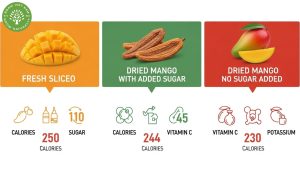
Understanding the different forms of mango can help you make smarter choices for your health. Fresh mango, for example, has around 99 calories per cup thanks to its high water content. In comparison, dried mango with no sugar added delivers those same nutrients in a smaller, more concentrated portion.
Regular dried mango with added sugar often packs 30–40% more calories per serving, along with preservatives or sweeteners that can trigger blood sugar spikes. Our sugar-free version, on the other hand, offers steady, balanced energy – a better fit for anyone watching their sugar intake.
It’s true that the drying process reduces some heat-sensitive vitamins like Vitamin C, but it also intensifies others such as Vitamin A and potassium. While fresh mango gives you more Vitamin C, dried mango wins in terms of convenience and shelf life – without losing most of its nutritional value.
There’s also freeze-dried mango, which often preserves even more of the original nutrients compared to traditional air-dried fruit. Its lighter texture and crisp bite make it a unique option, depending on your taste and how you like to enjoy your fruit.
Choosing quality dried mango products
Reading labels effectively
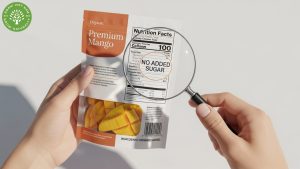
When choosing dried mango slices with no sugar added, the ingredient list should be beautifully simple – ideally just “organic mango” or “dried mango.” Anything more, like sulfur dioxide, artificial colors, or preservatives, takes away from the fruit’s natural goodness.
Opting for organic matters too. Because dried fruits are so concentrated, they can also concentrate any chemicals used during farming. Organic certification is your assurance that the mangoes were grown without synthetic pesticides or fertilizers, letting you enjoy pure fruit flavor and nutrition.
It’s also worth paying attention to where your mangoes come from and how they’re processed. Brands that are transparent about origin and methods are often the ones that truly care about quality – and about your health.
Processing methods matter
The way mangoes are dried makes a big difference to their nutrition and taste. Air-drying or sun-drying tends to preserve a different set of nutrients compared to freeze-drying or high-heat dehydration. In general, lower-temperature methods keep more of those delicate, heat-sensitive vitamins while giving the fruit that chewy texture so many people love.
Some producers take extra care by using minimal processing techniques, which help protect the fruit’s natural enzymes and beneficial compounds. While these methods may come with a slightly higher price tag, they often deliver far richer nutrition and a more authentic flavor – a true taste of real mango in every bite.
Smart serving suggestions and daily integration
Dried mango with no sugar added fits beautifully into a balanced daily routine. A 40-gram serving gives you a solid boost of nutrients without tipping your calorie budget, making it the perfect choice for a mid-morning pick-me-up or a clean source of energy before a workout.
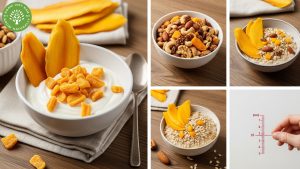
Pairing dried mango with a good source of protein – like a handful of nuts or a bowl of Greek yogurt – turns it into a balanced snack that fuels your body more steadily. The natural fruit sugars give you quick energy, while the protein and healthy fats help slow down absorption, keeping you satisfied for longer.
Dried mango also shines as a meal enhancer. A few chopped pieces can bring natural sweetness to oatmeal, brighten up a salad, or add a burst of flavor to homemade trail mix. Because its taste is so concentrated, a little is enough to satisfy sweet cravings in a wholesome way.
That said, portion awareness is important. Dried fruits are nutrient-rich but also calorie-dense. Measuring out your servings in the beginning can help you find the right balance that supports your health goals without overdoing it.
Frequently asked questions
How does dried mango without added sugar compare to fresh mango?
Dried mango is simply fresh mango with the water removed, which means its nutrients are more concentrated. You’ll get more potassium, Vitamin A, and fiber gram-for-gram, but fewer water-soluble vitamins like Vitamin C, which are sensitive to heat and processing.
Can people with diabetes enjoy unsweetened dried mango?
Yes – but in moderation. Even without added sugar, dried mango still contains natural fruit sugars that can affect blood glucose. Portion control is key, and it’s best to check with your healthcare provider for serving sizes that fit your needs.
How long does dried mango stay fresh once opened?
If stored in an airtight container, dried mango can stay fresh for 6–12 months. Keeping it in the fridge helps extend its shelf life even further while maintaining flavor and texture.
Are there any allergen concerns?
Pure dried mango is naturally free from common allergens. However, some brands process their fruit in facilities that also handle nuts or other potential allergens, so it’s always wise to double-check the label if you have sensitivities.
Your next step to healthier snacking
Dried mango with no sugar added is a smart choice for anyone who cares about health – packed with vitamins, minerals, and clean natural energy, with nothing artificial standing in the way. At Ogani VN, we carefully source only the highest-quality dried fruits to support your wellness journey every day.
Ready to enjoy the goodness of premium dried mango? Explore our range of organic, unsweetened dried mango slices and see just how simple – and delicious – healthy snacking can be. Nourish your body with nature’s sweetness, and let every bite remind you that wellness can be both wholesome and satisfying.
Read more:
- Dried Mango Benefits: 7 Amazing Health Reasons To Include This Superfruit In Your Diet
- Dried Mango Nutrition: Complete Guide To Health Benefits.
- Dried Unsweetened Mango: Healthy Snack Guide
- Dried Mango No Sugar Added Nutrition: Complete Guide to Healthy Snacking
- Dried Mango: Premium Snack for Health and Flavor
